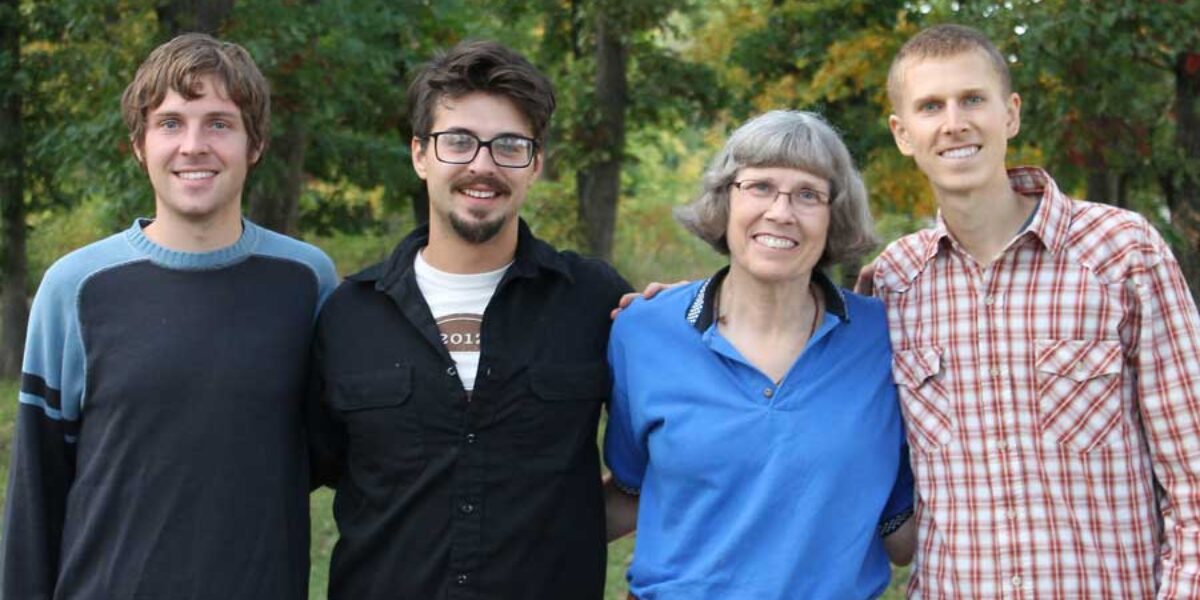Our North American culture has lost the important ceremonies and guided experiences that ritualized the transition from adolescence to adulthood. These rituals didn’t just acknowledge a physical change or change in responsibilities, but created a shift in perspective and spirit. Now, our culture only uses the societal road map as a checklist to mark adulthood: graduate high school, go to college or get a job, and by mid- to late-20s, start settling down. Although these events help us to mature, our lives are so busy with the demands of productivity, that we don’t cultivate intentionality of spirit, personal reflection, or guidance from elders and community. In the past two years, I have been very lucky to have participated in Mennonite Voluntary Service (MVS), and even luckier to have done so in Elkhart, Indiana. Here I have received this lost experience of being guided into adulthood by a great community of home, faith, service and neighbors.
Jubilee House (the name of our MVS house) has had a history of being much more than just an MVS house. It has been a gathering place for the neighborhood. In the past (we stopped this year but may start again), we have had a weekly community meal where everyone was welcomed. Though the stress of preparation and cleanup could be exhausting, the community meal gave our house, friends and neighbors time to take a break from life and just be together in fellowship.
Another connection point our house has with our community is the Pedal Power bike shop that is located in our garage. Pedal Power is run by a past Elkhart MVSer, and my current housemate, Nick Bauman, volunteers there as well. The mission of Pedal Power is to provide people with access to affordable eco-friendly transportation in Elkhart. Individuals who want a bike come and exchange labor in the shop for the bike of their choice. This also helps people develop skills to do future maintenance their bikes may need.
Many past members of the MVS unit have decided to remain in Elkhart, living out the lessons and practices they have cultivated during their term. This gives new MVSers a welcoming group of friends when they arrive, and helps continue the traditions of the house. I am very grateful for this group of people, for they have given me much guidance and comfort.
Service has also been important for me. I work with the Men Alive program at Church Community Services, an organization that helps people build better futures through emergency assistance and intensive job and life skills training. We work with men to develop life skills and better prepare them for the workforce. I could have done service anywhere, through another program or continued my employment as a child and family mental health case manager. But MVS offers something that employment and many other service programs don’t offer: a shift in perspective caused by the intersection of service, faith and community.
Unlike when I was doing case management work, I can see how Church Community Services directly supports the lives of individuals whom we live alongside in our neighborhood. Experiencing this intersection between service and community has broken down my dualistic mentality of “client” and “practitioner.” This intersection challenges the mentality of “us vs. them” and “us going to help them.” Instead, it embraces a universal Us and the fact that the problems of our world don’t just affect “them” but everyone, directly or indirectly.
MVS’s intention of faith has also been important to me. Before MVS, I was a “believer,” but I didn’t go to church, was ambivalent toward spiritual practices, and was never baptized. Elkhart MVS is sponsored by two churches: Prairie Street Mennonite Church and Fellowship of Hope, where I attend. It is hard for me to describe my transition into a more faith-focused life, because though it has been significant, it has been gradual. Fellowship of Hope used to be an intentional community years ago, which many of the members were part of. This history of living in community has cultivated a deep love and caring for one another that has drawn and kept me at this church. Many of the members have been teachers to me and have supported me in my decision to be baptized. I have learned the Mennonite Church traditions and history (both good and bad), cultivated spiritual practices, discerned Scripture for my life, and learned to develop a relationship with the Holy Spirit. I used to believe that churches were only about spreading religious dogma, but through my relationship with this congregation, I have learned that churches have the potential to be places that grow and cultivate deep spirituality and faith.
The last important part of MVS has been living in community with housemates whom you are given, not chosen. This is always challenging for everyone, but if you are honest with yourself, it can create the most personal growth. Before MVS, when I was working, I lived alone. I loved it, I was able to come and go as I pleased, thought only about my needs, and what I wanted to do. Living in community takes a lot of hard work. We all come from a variety of perspectives and experiences, from which we develop our different personal needs. It can be difficult to learn to balance the needs of others with your own needs. It is even more difficult when your personal needs, however small or big, are in conflict with the needs of another person in the house. This conflict can cause a lot frustration, impatience, and sometimes pain.
The theologian Jean Vanier states in From Brokenness to Community: “Community is a place of struggle, conflict and confrontation. For community to be successful, we have to admit to ourselves and others the nature of our transgressions toward one another; community is a place where the ego dies, it is a place of surrender. However, it is also a place of celebration, joy and, ultimately, of human fulfillment. For here we encounter God in the poverty and wounds of our hearts. God is not just present in the capacity to heal, but in the need to be healed.” I’m still learning to do this; I’m only a novice in community living and still have a long way to grow. But I recognize this as truth, not only in the home I live in, but in my service, in my spiritual life, and in my neighborhood.








